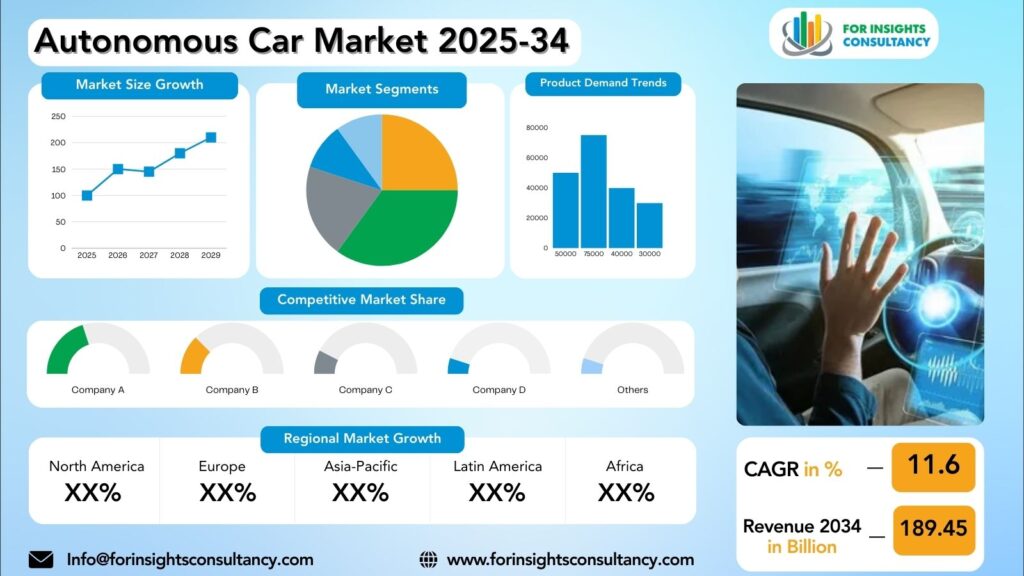
Autonomous Car Market Research Report by Level of Automation (SAE International) (Level 1 (Driver Assistance), Level 2 (Partial Automation), Level 3 (Conditional Automation), Level 4 (High Automation), Level 5 (Full Automation)), by Vehicle Type (Electronic Control Unit (ECU), Sensors, Actuators, Human-Machine Interface (HMI)), by (Commercial Vehicles, Passenger Cars, Defense/Military Vehicles), by Component, And Region Global Market Analysis and Forecast, 2025-2034
Aug-2025 Formats | PDF | Category: Automotive | Delivery: 24 to 72 Hours
Autonomous Car Market is forecast to increase from USD 42.67 billion in 2025 to USD 189.45 billion by 2034, at a CAGR of 11.6%.
Autonomous Car Market: A Comprehensive Overview and Future Developments
The autonomous car market is rapidly evolving, with major players like Tesla, Google, and Uber leading the way in developing self-driving technology. These vehicles have the potential to revolutionize commuting by offering increased safety, efficiency, and convenience. Manufacturers are investing heavily in research and development to bring these innovative vehicles to market.
The industry is buzzing with excitement about the possibilities of autonomous technology, with companies like Waymo conducting extensive testing of their self-driving vehicles in real-world scenarios. With advancements in artificial intelligence, machine learning, and sensor technology, self-driving vehicles are becoming more capable and reliable. In the coming years, fully autonomous cars will be on the roads, offering a safer and more efficient driving experience, reducing traffic congestion and improving road safety.
Autonomous Car Market Dynamics
Growth Drivers
Autonomous Car are becoming increasingly efficient and safer due to advancements in AI, sensor technology, and 5G technology. These technologies enable Autonomous Car to navigate roads, interpret traffic signs, and make decisions in real-time. The convenience of hands-free driving and environmental awareness are also driving the market. Autonomous Car offer a more comfortable travel experience, attracting consumers who value their time. Governments worldwide are setting safety standards and regulations for Autonomous Car to protect passengers and pedestrians. These regulations are essential for building trust in autonomous technology and accelerating its adoption. Governments are also investing in infrastructure projects to support the integration of autonomous cars on public roads, such as smart highways, dedicated lanes, and charging stations for electric autonomous cars. As a result, the autonomous car market is attracting more consumers who value safety, convenience, and environmental awareness.
Restraints
The autonomous car market faces several challenges, including regulatory hurdles, safety concerns, high costs, limited infrastructure, and data privacy and security. The complex regulatory environment, a result of governments developing comprehensive legislation, can slow down the adoption of self-driving cars and hinder their widespread deployment. Safety concerns arise from high-profile incidents involving autonomous vehicles, raising skepticism among consumers. Lowering production costs and making autonomous cars more affordable will be key to driving market growth and expanding the customer base.
High costs associated with research, development, and technology development can be a significant barrier for new entrants and startups in the market. Lowering production costs and making autonomous cars more affordable will drive market growth and expand the customer base. Limited infrastructure, such as smart roads, communication networks, and charging stations, is essential for the success of autonomous vehicles. Addressing the infrastructure gap is crucial for unlocking the full potential of the autonomous car market.
Data privacy and security are also crucial for autonomous cars, as they rely on vast amounts of data to operate effectively. Ensuring robust data privacy measures and cybersecurity protocols is crucial for building trust among consumers and stakeholders. Failure to address these concerns could hinder the growth of the autonomous car market and undermine confidence in self-driving technology.
Opportunity
Autonomous vehicle technology presents a unique opportunity for companies to lead the market by investing in artificial intelligence, sensor technology, and connectivity solutions. Collaborations with technology companies, automotive manufacturers, and transportation service providers can accelerate innovation and access new markets. The rise of autonomous vehicles presents an opportunity for businesses to expand their mobility services, including ride-sharing and delivery services, to meet the growing demand for convenient and efficient transportation solutions. As cities invest in smart infrastructure and sustainability initiatives, businesses can integrate autonomous vehicles seamlessly into smart city environments. Autonomous vehicles can revolutionize the customer experience by offering personalized services, such as in-car entertainment, connectivity features, and safety enhancements. By leveraging these opportunities, businesses can differentiate themselves in the market and drive growth in the autonomous car market.
Challenges
The autonomous car market faces several challenges, including safety concerns, regulatory hurdles, cybersecurity risks, and technical limitations. While self-driving technology has the potential to reduce accidents caused by human error, incidents have raised questions about its reliability and safety. Companies in the market are working on developing advanced sensor technology and artificial intelligence algorithms to improve safety and gain public trust.
Regulatory hurdles are another challenge, as different countries and regions have different rules and standards for autonomous vehicles, making it difficult for companies to develop and deploy their technology globally. Governments are also grappling with regulating autonomous vehicles in a way that ensures safety while fostering innovation.
Cybersecurity risks are another concern, as hackers could potentially compromise a self-driving car’s operation. Companies are investing in robust cybersecurity measures to protect their vehicles from cyber threats and ensure the safety and integrity of their operations. Secure communication protocols, encryption techniques, and intrusion detection systems are some strategies being employed to address cybersecurity risks in autonomous vehicles.
Technical limitations, such as adverse weather conditions, complex road scenarios, and the ability to interpret human behavior, pose significant obstacles to the widespread adoption of autonomous cars. Companies are conducting extensive testing and research to improve their vehicles’ capabilities and address these technical limitations. Advancements in artificial intelligence, machine learning, and sensor technology are helping to make autonomous vehicles more reliable and responsive in various driving conditions.
Autonomous Car Market Top Companies Covered In This Report:
Evaluate The Strategic Positioning And Innovation Pipelines Of Leading Market Companies-From Multinational Enterprises To Disruptive Regional Firms. Understand How Key Players Are Innovating, Expanding, And Capturing Value, And Use Competitive Benchmarks To Plan Your Next Move.
- Ford Motor
- General Motors
- Hyundai Motor
- Baidu
- BMW
- Mercedes-Benz
- Tesla
- Toyota Motor
- Volkswagen
- Waymo
Autonomous Car Market News
Hyundai is actively developing autonomous car technology, aiming to equip its vehicles with Level 2+ autonomous driving systems by 2027, utilizing advanced AI and deep learning. The company’s IONIQ 5 platform was featured in a Level 4 robotaxi initiative, showcasing their progress in the field.
May 09, 2025 First Ride Review: Mercedes-Benz’s Drive Assist Pro Delivers Near-Autonomous Capability
The new AI-powered system delivers near-autonomous driving even in city traffic—and it’s coming to the U.S. in 2026.
Mercedes-Benz global product development chief Oliver Löcher has both feet off the pedals as his right hand barely brushes the steering wheel while the electric-powered Mercedes 2026 CLA sedan eases through Shanghai traffic.
25.06.2024 Road to autonomous driving: BMW is the first car manufacturer to receive approval for the combination of Level 2 and Level 3.
Munich. BMW is the first carmaker in the world to receive approval for a combination of a Level 2 driving assistance system (the BMW Highway Assistant) and a Level 3 system in the form of the BMW Personal Pilot L3 in the same vehicle. The new BMW 7 Series therefore sets a milestone in the field of automated driving by offering a unique opportunity to enjoy the benefits of both systems in the same car.
Segmented View of the Industry:
The Autonomous Car Market Is Mapped Through A Multidimensional Lens-Tracking Shifts Across Product Type, Applications, And Geographic Regions. This Segmented Approach Enables Businesses To Localize Their Growth Plans And Align Offerings With The Most Profitable Demand Centers.
Segmentation by Vehicle Type
- Commercial Vehicles
- Passenger Cars
- Defense/Military Vehicles
Segmentation by Level of Automation (SAE International)
- Level 1 (Driver Assistance)
- Level 2 (Partial Automation)
- Level 3 (Conditional Automation)
- Level 4 (High Automation)
- Level 5 (Full Automation)
Segmentation by Component
- Hardware
- Software
Segmentation by Propulsion Type
- Internal Combustion Engine (ICE)
- Hybrid Electric Vehicles (HEV)
- Battery Electric Vehicles (BEV)
Segmentation by Mobility Form
- Shared Mobility
- Personal Ownership
Global Geographic Coverage:
The Report Provides In-Depth Qualitative and Quantitative Data On the Autonomous Car Market For All Of The Regions And Countries Listed Below:
North America
The United States is a leading player in the development and adoption of autonomous vehicles, with companies like Tesla, Waymo, and General Motors leading the way. The US regulatory framework and government investment in infrastructure support for autonomous vehicles have allowed for rapid advancements. Canada, with companies like Blackberry QNX and Magna, is also making strides in the market. The Canadian government supports innovation by funding research and development projects. The harsh winter conditions in Canada make it an ideal testing ground for autonomous vehicles, ensuring reliable performance in all weather conditions.
Mexico, a lesser-known player in the market, is also making significant advancements in autonomous vehicle technology. Companies like Grupo Bimbo and Giant Motors are investing in autonomous vehicle technology to make Mexico a hub for automotive innovation. The Mexican government has launched initiatives to encourage research and collaboration in this sector. With a growing economy and burgeoning tech industry, Mexico is poised to become a key player in the autonomous car market in the near future.
Europe
Germany is leading the way in autonomous technology, with companies like BMW, Mercedes-Benz, and Volkswagen developing advanced technologies. The country has also been actively promoting autonomous vehicles in the transportation system. France, with companies like Renault and Peugeot investing heavily in research and development, is expected to be a key market for autonomous cars in the coming years. The UK is also pioneering autonomous mobility solutions, with initiatives like the UK Autodrive project testing autonomous vehicles in real-world scenarios. Companies like Jaguar Land Rover and Dyson are investing in autonomous technology, positioning the UK as a hub for innovation in the autonomous car market. Italy is also embracing autonomous solutions for urban mobility, with cities like Turin and Milan testing autonomous vehicles for public transportation. Companies like Fiat Chrysler Automobiles are exploring autonomous technology to improve urban mobility and reduce traffic congestion. With a rich automotive heritage and commitment to sustainability, Italy is paving the way for autonomous transportation in urban environments.
Asia Pacific
China, Japan, South Korea, and India are all leading the way in the autonomous car market. China, led by tech giants Baidu and Tencent, is investing heavily in self-driving technology, with plans to introduce self-driving cars in major cities like Shanghai and Beijing. Japan’s government has also been supportive, providing funding and regulatory support to accelerate innovation. Japan’s automakers are focusing on safety and reliability, reshaping the future of transportation. South Korea, led by Hyundai and Kia, is also making significant strides in the autonomous car market, with the government promoting connected and intelligent transportation systems. India, with its strong industrial base and innovation culture, is gradually embracing autonomous car technology. While the regulatory environment and infrastructure in India pose challenges for autonomous car deployment, there is growing recognition of the potential benefits of self-driving vehicles in improving road safety and reducing traffic congestion. As the Indian market matures and evolves, the global market for autonomous cars is expected to grow.
Middle East and Africa
The Middle East is emerging as a key player in the autonomous car market, with countries like the United Arab Emirates (UAE) leading the way in innovation. The UAE has established itself as a hub for autonomous vehicle testing, with initiatives like the Dubai Autonomous Transportation Strategy aiming to enhance mobility in the city. Saudi Arabia is also making strides in this sector, with government support and investments driving the growth of autonomous technologies in the country.
Africa is also gaining momentum in the autonomous car market, particularly in countries like South Africa and Kenya. Initiatives like the Gauteng Connected Autonomous Vehicle Network in South Africa are laying the foundation for the adoption of self-driving vehicles. Kenya is focusing on integrating autonomous technologies into public transportation systems to improve mobility and reduce traffic congestion in urban areas.
Reasons to Buy:
- The Research Would Help Top Administration/Policymakers/Professionals/Product Advancements/Sales Managers And Stakeholders In This Market In The Following Ways.
- The Report Provides Autonomous Car Market Revenues At The Worldwide, Regional, And Country Levels With A Complete Analysis To 2034 Permitting Companies To Analyze Their Market Share And Analyze Projections, And Find New Markets To Aim For.
- To Understand The Most Affecting Driving And Restraining Forces In The Market And Their Impact On The Global Market.
- Major Changes And Assessment In Market Dynamics And Developments.
- The Objective Of The Autonomous Car Market Report Is To Identify New Business Opportunities Using Quantitative Market Forecasts.
- Formulate Sales And Marketing Strategies By Gaining An Understanding Of Competitors, Their Positioning, And Strengths & Weaknesses.
Faq – What Global Leaders Are Asking
What Is The Growth Prospect For The Autonomous Car Market By 2034?
Autonomous Car Market Is Expected To Achieve A Stable Growth Rate With A Compound Annual Growth Rate (Cagr) Of About 11.6% From 2025 Through 2034.
What Is Driving The Growth Of The Autonomous Car Market?
The growth of the autonomous car market is primarily driven by significant advancements in AI, machine learning, and sensor technologies. This is coupled with increasing government regulations aimed at improving road safety and a strong consumer and commercial demand for more efficient and convenient transportation solutions.
Who Are The Key Players In The Autonomous Car Market, And What Are Their Market Shares?
The Autonomous Car Market Includes Major Companies Like Ford Motor, General Motors, Hyundai Motor, Baidu, BMW, Mercedes-Benz, Tesla, Toyota Motor, Volkswagen, Waymo.
Specific Market Share Data Is Not Publicly Available And Is Typically Provided In Detailed, Proprietary Market Research Reports.
Which Regions Are Leading The Autonomous Car Market Growth?
The Asia-Pacific region currently holds the largest share of the autonomous car market, driven by rapid technological adoption and strong government support in countries like China and Japan. However, North America is also a key leader, with significant investment from major tech companies and a high concentration of autonomous vehicle testing and deployment.
Customization: We Can Provide Following Things
1) On Market More Company Profiles (Competitors)
2) Data About Particular Country Or Region
3) We Will Incorporate The Same With No Additional Cost (Post Conducting Feasibility).
Any Requirement Contact Us: Https://Www.Forinsightsconsultancy.Com/Contact-Us/
Table of Contents
For TOC Contact us: https://forinsightsconsultancy.com/contact-us/






